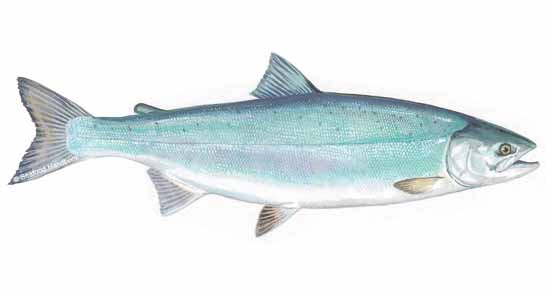Salmon, Sockeye
Published on
January 23, 2014

Sockeye salmon is the most valuable U.S. salmon species and the premium canned salmon, known as red salmon to canners. Sockeye are also known as kokanees (a landlocked species) and quinaults. The name sockeye has nothing to do with the fish’s eyes but is a corruption of the Native American name sukkai. Sockeye range from California’s Sacramento River system north to the Bering Sea and then south to northern Hokkaido. Bristol Bay, Alaska, has the largest sockeye run, during which millions of fish are taken. Wild-run Bristol Bay sockeye are of such quality that they often compete with Chilean farm-raised coho on the world market. There are also major runs in the Copper River and parts of Southeast Alaska. Commercially caught fish run 4 to 10 pounds. Most are caught with gillnets. You’ll pay a premium for seine-caught fish, but they’re very good, as are the small portion of troll-caught sockeye salmon. Sockeye are not farmed.
Oncorhynchus nerka
Salmon, red salmon, sockeye, blueback
Sockeye salmon
Saumon rouge
Rotlachs
Salmone rosso
Sake masu-rui
Salmón sockeye
Sockeye salmon is the most valuable U.S. salmon species and the premium canned salmon, known as red salmon to canners. Sockeye are also known as kokanees (a landlocked species) and quinaults. The name sockeye has nothing to do with the fish’s eyes but is a corruption of the Native American name sukkai. Sockeye range from California’s Sacramento River system north to the Bering Sea and then south to northern Hokkaido. Bristol Bay, Alaska, has the largest sockeye run, during which millions of fish are taken. Wild-run Bristol Bay sockeye are of such quality that they often compete with Chilean farm-raised coho on the world market. There are also major runs in the Copper River and parts of Southeast Alaska. Commercially caught fish run 4 to 10 pounds. Most are caught with gillnets. You’ll pay a premium for seine-caught fish, but they’re very good, as are the small portion of troll-caught sockeye salmon. Sockeye are not farmed.
For its long migration, the sockeye carries a large amount of fat, making it rich in omega-3s. This gives the meat a nice, rich flavor. Some people feel the flavor rivals or is even better than that of chinook.The raw meat is firm and has a bright-red or orange-red color. Sockeyes are the reddest-fleshed of the wild salmon. Cooked meat remains red and firm. Skin and flesh color make sockeye attractive as a display item and in buffets.
| Calories: | 168 |
| Fat Calories: | 77 |
| Total Fat: | 8.6 g |
| Saturated Fat: | 1.5 g |
| Cholesterol: | 62 mg |
| Sodium: | 47 mg |
| Protein: | 21.3 g |
| Omega 3: | 1.2 g |
A light marinade and simple grilling treatment showcase the wonderful flavor of sockeye. Use salmon steaks 1 to 2 inches thick. Prepare a mari-nade by mixing 1 cup white wine with 1/4 teaspoon dried marjoram, 1 teaspoon minced onion and freshly ground black pepper. Marinate in the refrigerator for a couple of hours, turning the salmon once or twice. Grill until fish flakes readily and is no longer translucent.
Chinook salmon, Coho salmon, Rainbow trout
- Bake
- Boil
- Broil
- Fry
- Grill
- Pate
- Poach
- Saute
- Smoke
- Steam
Fresh: Dressed, Steaks, Fillets (bone-in/boneless)
Frozen: H&G, Steaks, Fillets
Value-added: Canned (primary form), Smoked (hot-smoked), Burgers (patties)
Canada, Japan, Russia, United States





